
Pagans’ advocate.
A professing pagan in an aggressively Christian empire, a friend of the emperor Julian and acquaintance of St. Basil, a potent spokesman for private and political causes—Libanius can tell us much about the tumultuous world of the fourth century.
Born in Antioch to a wealthy family steeped in the culture and religious traditions of Hellenism, Libanius rose to fame as a teacher of the classics in a period of rapid social change. In his lifetime Libanius was an acknowledged master of the art of letter writing. Today his letters—about 1550 of which survive—offer an enthralling self-portrait of this combative pagan publicist and a vivid picture of the culture and political intrigues of the eastern empire. A. F. Norman selects one eighth of the extant letters, which come from two periods in Libanius’ life, AD 355–365 and 388–393, letters written to Julian, churchmen, civil officials, scholars, and his many influential friends. The Letters are complemented, in this two-volume edition, by Libanius’ Autobiography (Oration 1), a revealing narrative that begins as a scholar’s account and ends as an old man’s private journal.
Also available in the Loeb Classical Library is a two-volume edition of Libanius’ Orations.

Pagans’ advocate.
A professing pagan in an aggressively Christian empire, a friend of the emperor Julian and acquaintance of St. Basil, a potent spokesman for private and political causes—Libanius can tell us much about the tumultuous world of the fourth century.
Born in Antioch to a wealthy family steeped in the culture and religious traditions of Hellenism, Libanius rose to fame as a teacher of the classics in a period of rapid social change. In his lifetime Libanius was an acknowledged master of the art of letter writing. Today his letters—about 1550 of which survive—offer an enthralling self-portrait of this combative pagan publicist and a vivid picture of the culture and political intrigues of the eastern empire. A. F. Norman selects one eighth of the extant letters, which come from two periods in Libanius’ life, AD 355–365 and 388–393, letters written to Julian, churchmen, civil officials, scholars, and his many influential friends. The Letters are complemented, in this two-volume edition, by Libanius’ Autobiography (Oration 1), a revealing narrative that begins as a scholar’s account and ends as an old man’s private journal.
Also available in the Loeb Classical Library is a two-volume edition of Libanius’ Orations.
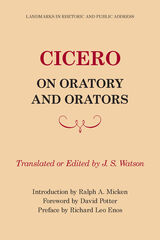
Contains Cicero’s De Oratore and Brutus, influential sources over the centuries for ideas on rhetoric and training for public leadership.
The De Oratore, written in 55 B.C., argues that rhetoric is socially significant because states are established and maintained through the leadership of eloquent men.
The three books of dialogues in this volume feature discussions between well-known figures in Roman history, including Lucius Crassus, Marcus Antonius, Quintus Lutatius Catulus, Quintus Marcius Scaevola, Caius Aurelius Cotta, Julius Caesar Strabo Vopicus, and Publius Sulpicus Rufus.
The Brutus continues the theme of the dialogues, giving a history of eminent orators whose performances exemplify the Ciceronian theory that rhetoric finally adds up to leadership.

Raouf Mama is widely beloved by children and adults alike for his books and especially for his African and multicultural storytelling, which incorporates poetry, song, music, and dance.
In Fortune’s Favored Child, the master storyteller tells his own story, beginning in the West African country of Benin. Through a harrowing experience with sickness, an encounter with a clairvoyant traditional healer, and astonishing twists of fortune, the protagonist struggles to uncover his real identity, to get an education, and to make his own way in the world. His journey takes him to the shores of the United States to attend graduate school at the University of Michigan and begin a new chapter in his life.

This is a study of a man who was the presiding genius of Latin letters in the second century, the leading orator and lawyer of his day, a prominent senator and consul, the close friend of four emperors and the teacher of two, including the philosopher-emperor Marcus Aurelius. It is a history that tells as much about the age as the man.
The book begins in Roman North Africa, with an account of Fronto's family and education and the province's influence on his career. After a brief glance at his Italian milieu, Champlin examines Fronto's letters for what they reveal about Fronto and about literary life in the second century. Next come portrayals of Fronto as lawyer, as senator, and as courtier--chapters in Fronto's life that yield a full picture of Antonine society. A final chapter discusses what Marcus Aurelius learned from the orator.
The fragmentary nature of Fronto's letters has seriously hampered their use as a historical source. By close analysis of many of the letters and by the deployment of formidable prosopographical skills, Champlin has coaxed information out of this rich material, and he weaves it into a clear social history.
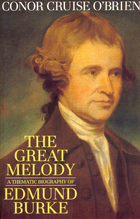
"In bringing Burke to our attention, Mr. O'Brien has brought back a lost treasure. The Great Melody is a brilliant work of narrative sweep and analytical depth. Conor Cruise O'Brien on Edmund Burke is a literary gift to political thought."—John Patrick Diggins, New York Times Book Review
"Serious readers of history are in for a treat: a book by the greatest living Irishman on the greatest Irishman who ever lived. . . . O'Brien's study is not merely a reconstruction of a fascinating man and period. It is also a tract for the times. . . . I cannot remember another time when I finished a book of more than 600 pages wishing it were longer."—Paul Johnson, The Independent
"The Great Melody combines superb biography and fascinating history with a profound understanding of political philosophy."—Former President Richard Nixon
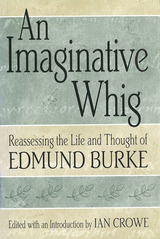
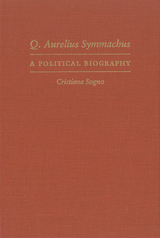
Symmachus was a brilliant orator, writer, and statesman, often flatly labeled as one of the last pagan senators. Cristiana Sogno offers a reconstruction of the political career of Symmachus through close analysis of his extensive writings, while also proposing a critical reevaluation of his historical importance. In contrast to traditional interpretation, Sogno's study demonstrates that Symmachus was primarily an influential politician, rather than a mere pagan zealot.
By portraying the individual experience of Symmachus, the book sets forth a new approach for interpreting the political aspirations, mentality, and attitudes of Roman senators. The much-studied question of the Christianization of the Western aristocracy has created the illusion of a Christian and a pagan aristocracy rigidly separated from each other. Through her study of Symmachus, Sogno demonstrates the primary importance of politics over religion in the public activity of the late Roman aristocracy. Although the book is specifically addressed to scholars and students of Late Antiquity, it will also be of interest to classicists, ancient historians, and non-specialists who wish to know more about this pivotal period in Roman history.
Cristiana Sogno received her Ph.D. in Classics and History from Yale University. Currently she is Townsend Assistant Professor of Classics at Cornell University. Visit Professor Sogno's website at: http://www.fordham.edu.
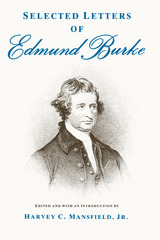
READERS
Browse our collection.
PUBLISHERS
See BiblioVault's publisher services.
STUDENT SERVICES
Files for college accessibility offices.
UChicago Accessibility Resources
home | accessibility | search | about | contact us
BiblioVault ® 2001 - 2024
The University of Chicago Press









